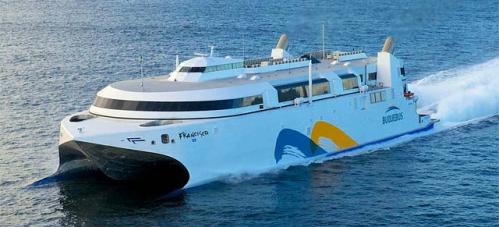The World’s Fastest Ship
The World’s Fastest Ship – Built in Tasmania is Christened by Argentina’s President
A few hours ago in Buenos Aires the President of Argentina, Christina Fernandez de Kirchner became the “Godmother” to a vessel built in Australia.
Named Francisco in honour of the Argentine born Pope, the 99 metre World’s Fastest Ship, and the first large dual fuel high speed Ro-Ro to use LNG as its primary fuel, was built in Hobart by Incat Tasmania Pty Ltd and delivered recently to South American company Buquebus.
The Argentinian President was joined by the President of Uruguay Jose Mujica, at the glittering ceremony in Buenos Aires, with both Presidents jointly cutting the ribbon at around 8pm Monday evening Argentina time in front of 1500 invited VIP guests.
The attached U-tube clip from Argentina Public Television shows the Presidents of Argentina and Uruguay at the ceremony together with Senor Lopez Mena, the President of Buquebus.
Visión 7: Cristina y Mujica bautizaron a “Francisco”, la nueva nave de la flota Buquebús – YouTube
LATEST VIDEOS
The ship, Francisco, commences service tomorrow on the River Plate (Rio Plato) between Buenos Aires and Montevideo.
Francisco has capacity for 1,000 persons and 150 cars. A luxurious fit out has been incorporated, including an enormous 1,100 square metre duty-free shop and passenger accommodation for economy, tourist, business, and first class plus an exclusive VIP lounge.
Australian ferry builder Incat Tasmania’s world first high speed dual-fuel vehicle and passenger ferry is the world’s fastest ship having achieved a lightship speed of 58.1 knots – (107.6 kilometres an hour).
This is certainly the fastest ship in the world……of course there’s a few speed boats that could surpass 58 knots but nothing that could carry 1000 passengers and 150 cars, and with an enormous duty free shop on board.
The vessel’s high speed can be attributed to the combination of Incat wave piercing catamaran design, the use of lightweight, strong marine grade aluminium, and the power produced by the two 22MW GE LM2500 gas turbines driving Wartsila LJX 1720 SR waterjets.
The extensive and luxurious interior, designed by Uruguayan Julio Cesar Ortega, is elegant and open in layout. The expansive duty free shop made significant increases to the weight of the interior fitout, however the Incat team worked diligently to maximise weight savings during construction wherever possible.
Incat Chairman, Robert Clifford, currently in Europe, said “Incat is delighted with the efficiency of the design and sure that our customer, Buquebus, are thrilled with the results, enabling the ferry to compete with airline traffic on the River Plate route.”
Buquebus has clearly demonstrated their preference for Incat technology over a twenty year period and Francisco (hull 069) is the eighth Incat vessel to be operated by Buquebus and their associated companies. It is the largest catamaran they have operated, the world’s first dual fuel high speed ferry to operate on LNG as its primary fuel, and the fastest, environmentally cleanest, most efficient, high speed ferry in the world.
Incat’s High Speed Record
The fastest previous vessel built by Incat was Juan Patricio, delivered also to Buquebus, with a top speed at 53.8 knots. Juan Patriciowas delivered in 1996 and remains in commercial service.
Francisco is the fourth Incat built vessel with service speed over 50 knots.
The past three consecutive winners of the Hales Trophy, the Transatlantic Blue Riband record for commercial passenger ships, were all built by Incat. The average speed over the 3 day (unrefueled) voyage of Incat hull 049 was 41.284 knots.

Comments
Post a Comment